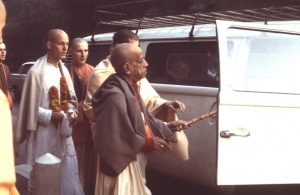CC Madhya 13.61: Difference between revisions
m (1 revision(s)) |
(Vanibot #0054 edit - transform synonyms into clickable links, which search similar occurrences) |
||
| (One intermediate revision by one other user not shown) | |||
| Line 1: | Line 1: | ||
{{ | [[Category:Sri Caitanya-caritamrta - Madhya-lila Chapter 13|C061]] | ||
<div style="float:left">'''[[Sri Caitanya-caritamrta|Śrī Caitanya-caritāmṛta]] - [[CC Madhya|Madhya-līlā]] - [[CC Madhya 13|Chapter 13: The Ecstatic Dancing of the Lord at Ratha-yātrā]]'''</div> | |||
<div style="float:right">[[File:Go-previous.png|link=CC Madhya 13.60|Madhya-līlā 13.60]] '''[[CC Madhya 13.60|Madhya-līlā 13.60]] - [[CC Madhya 13.62|Madhya-līlā 13.62]]''' [[File:Go-next.png|link=CC Madhya 13.62|Madhya-līlā 13.62]]</div> | |||
{{CompareVersions|CC|Madhya 13.61|CC 1975|CC 1996}} | |||
{{RandomImage}} | |||
==== TEXT 61 ==== | ==== TEXT 61 ==== | ||
<div | <div class="verse"> | ||
sākṣāte nā deya dekhā, parokṣe ta’ dayā | :sākṣāte nā deya dekhā, parokṣe ta’ dayā | ||
ke bujhite pāre caitanya-candrera māyā | :ke bujhite pāre caitanya-candrera māyā | ||
</div> | </div> | ||
| Line 12: | Line 16: | ||
==== SYNONYMS ==== | ==== SYNONYMS ==== | ||
<div | <div class="synonyms"> | ||
''[//vanipedia.org/wiki/Special:VaniSearch?s=sākṣāte&tab=syno_o&ds=1 sākṣāte]'' — directly; ''[//vanipedia.org/wiki/Special:VaniSearch?s=nā&tab=syno_o&ds=1 nā]'' — not; ''[//vanipedia.org/wiki/Special:VaniSearch?s=deya&tab=syno_o&ds=1 deya]'' — gives; ''[//vanipedia.org/wiki/Special:VaniSearch?s=dekhā&tab=syno_o&ds=1 dekhā]'' — interview; ''[//vanipedia.org/wiki/Special:VaniSearch?s=parokṣe&tab=syno_o&ds=1 parokṣe]'' — indirectly; ''[//vanipedia.org/wiki/Special:VaniSearch?s=ta’&tab=syno_o&ds=1 ta’]'' — indeed; ''[//vanipedia.org/wiki/Special:VaniSearch?s=dayā&tab=syno_o&ds=1 dayā]'' — there was mercy; ''[//vanipedia.org/wiki/Special:VaniSearch?s=ke&tab=syno_o&ds=1 ke]'' — who; ''[//vanipedia.org/wiki/Special:VaniSearch?s=bujhite&tab=syno_o&ds=1 bujhite]'' — to understand; ''[//vanipedia.org/wiki/Special:VaniSearch?s=pāre&tab=syno_o&ds=1 pāre]'' — is able; ''[//vanipedia.org/wiki/Special:VaniSearch?s=caitanya&tab=syno_o&ds=1 caitanya]-[//vanipedia.org/wiki/Special:VaniSearch?s=candrera&tab=syno_o&ds=1 candrera]'' — of Lord Śrī Caitanya Mahāprabhu; ''[//vanipedia.org/wiki/Special:VaniSearch?s=māyā&tab=syno_o&ds=1 māyā]'' — internal potency. | |||
</div> | </div> | ||
| Line 19: | Line 23: | ||
==== TRANSLATION ==== | ==== TRANSLATION ==== | ||
<div | <div class="translation"> | ||
Although the King had been refused an interview, he was indirectly bestowed causeless mercy. Who can understand the internal potency of Śrī Caitanya Mahāprabhu? | Although the King had been refused an interview, he was indirectly bestowed causeless mercy. Who can understand the internal potency of Śrī Caitanya Mahāprabhu? | ||
</div> | </div> | ||
| Line 26: | Line 30: | ||
==== PURPORT ==== | ==== PURPORT ==== | ||
<div | <div class="purport"> | ||
As Śrī Caitanya Mahāprabhu was playing the part of a world teacher, He did not agree to see the King, because a king is a mundane person interested in money and women. Indeed, the very word “king” suggests one who is always surrounded by money and women. As a sannyāsī, Śrī Caitanya Mahāprabhu was afraid of both money and women. The very word “king” is repugnant to one who is in the renounced order of life. Śrī Caitanya Mahāprabhu refused to see the King, but indirectly, by the Lord’s causeless mercy, the King was able to understand the Lord’s mysterious activities. Lord Caitanya Mahāprabhu’s activities were exhibited sometimes to reveal Him as the Supreme Personality of Godhead and sometimes to show Him as a devotee. Both kinds of activities are mysterious and appreciated only by pure devotees. | As Śrī Caitanya Mahāprabhu was playing the part of a world teacher, He did not agree to see the King, because a king is a mundane person interested in money and women. Indeed, the very word “king” suggests one who is always surrounded by money and women. As a ''sannyāsī'', Śrī Caitanya Mahāprabhu was afraid of both money and women. The very word “king” is repugnant to one who is in the renounced order of life. Śrī Caitanya Mahāprabhu refused to see the King, but indirectly, by the Lord’s causeless mercy, the King was able to understand the Lord’s mysterious activities. Lord Caitanya Mahāprabhu’s activities were exhibited sometimes to reveal Him as the Supreme Personality of Godhead and sometimes to show Him as a devotee. Both kinds of activities are mysterious and appreciated only by pure devotees. | ||
</div> | </div> | ||
__NOTOC__ | |||
<div style="float:right; clear:both;">[[File:Go-previous.png|link=CC Madhya 13.60|Madhya-līlā 13.60]] '''[[CC Madhya 13.60|Madhya-līlā 13.60]] - [[CC Madhya 13.62|Madhya-līlā 13.62]]''' [[File:Go-next.png|link=CC Madhya 13.62|Madhya-līlā 13.62]]</div> | |||
__NOTOC__ | |||
__NOEDITSECTION__ | |||
Latest revision as of 21:42, 19 February 2024

A.C. Bhaktivedanta Swami Prabhupada
TEXT 61
- sākṣāte nā deya dekhā, parokṣe ta’ dayā
- ke bujhite pāre caitanya-candrera māyā
SYNONYMS
sākṣāte — directly; nā — not; deya — gives; dekhā — interview; parokṣe — indirectly; ta’ — indeed; dayā — there was mercy; ke — who; bujhite — to understand; pāre — is able; caitanya-candrera — of Lord Śrī Caitanya Mahāprabhu; māyā — internal potency.
TRANSLATION
Although the King had been refused an interview, he was indirectly bestowed causeless mercy. Who can understand the internal potency of Śrī Caitanya Mahāprabhu?
PURPORT
As Śrī Caitanya Mahāprabhu was playing the part of a world teacher, He did not agree to see the King, because a king is a mundane person interested in money and women. Indeed, the very word “king” suggests one who is always surrounded by money and women. As a sannyāsī, Śrī Caitanya Mahāprabhu was afraid of both money and women. The very word “king” is repugnant to one who is in the renounced order of life. Śrī Caitanya Mahāprabhu refused to see the King, but indirectly, by the Lord’s causeless mercy, the King was able to understand the Lord’s mysterious activities. Lord Caitanya Mahāprabhu’s activities were exhibited sometimes to reveal Him as the Supreme Personality of Godhead and sometimes to show Him as a devotee. Both kinds of activities are mysterious and appreciated only by pure devotees.